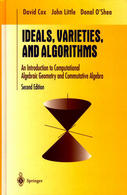
(Elementary) Algebraic Geometry from an algorithmic point of view
 |
(Elementary) Algebraic Geometry from an algorithmic point of view |
Instructor
Sorin Popescu
(office: Math 4-119, tel. 632-8358, e-mail
sorin@math.sunysb.edu)
Location MAT S-235, TuTh 12:50-2:10
| Prerequisites |
A good foundation in linear algebra and some knowledge of abstract algebra (such as MAT 313 or MAT 311 or MAT 312). However, I will try to keep the amount of required previous knowledge to a minimum. The seminar will require active student participation and will encourage student discoveries of known (and perhaps unknown) mathematics.
| Textbook(s) |
|
Ideals, Varieties, and Algorithms (An Introduction to
Computational Algebraic Geometry and Commutative Algebra), by D. Cox, J. Little, D. O'Shea, Springer Undergraduate Texts, Second Edition 1997 This book is a gentle introduction to computational algebraic geometry and commutative algebra at the undergraduate level. It discusses systems of polynomial equations ("ideals"), their solutions ("varieties"), and how these objects can be manipulated ("algorithms"). The Table of Contents may give you a more detailed picture of the topics covered in the book. Other recommended texts:
|
 |
| Seminar plan |
The seminar will address the following topics:
| Homework |
I will assign problems in each lecture, ranging in difficulty from routine to more challenging. Course grades will be based on these problems and any other class participation; solving at least 2/3 of them will be considered a perfect score. Late homework will be accepted until the second class meeting after the due date, but will not be accepted after that time. Each student will also be required to deliver a 20-30 minute (depending on class size) presentation and hand in one-two papers or computer projects (the first is due by November 1; the second by December 1)
| Software documentation, tutorials, and computer projects |
We will use the math computer lab in S-235 of the math tower; this lab contains 30 Sun workstations running Unix, as well as a number of PCs running Windows NT. We will be using the Unix machines in class; however, much of the work can be done on other systems. We will rely heavily on Macaulay 2 (a software system devoted to supporting computations in algebraic geometry and commutative algebra) and Maple (a program that can do algebra, calculus, graphics, etc.), although if other tools are better suited to the task, we may make use of them. No previous experience with computers is needed.
Macaulay 2 and Maple are available for most platforms (Unix, Macintosh, Windows, etc); Macaulay 2 can be freely downloaded from the following location, while a student version of Maple can be purchased from Waterloo Maple for $99. You can also use the campus modem pool to dial-in to the mathlab computers.
Here are some important things to read:
On pages 510 and 512 of the second edition of Ideals, Varieties, and Algorithms, Appendix C mentions computer packages for Maple and Mathematica. These were written mainly for teaching purposes and tend to be rather slow in comparison with a dedicated system as Macaulay 2. You may browse/download these packages from David A. Cox's web site. For Maple V, Release 5(1) you may also download the package, a tutorial and a reference worksheet from the following location:
Macaulay 2 is a software system devoted to supporting research in algebraic geometry and commutative algebra, developed by Daniel R. Grayson and Michael E. Stillman. Here are two elementary tutorials:
| Worksheets, handouts, and other class related materials: |
Download class related materials from the following links:
| Links |
Here are some links related to (elementary) uses of Gröbner bases:
| Special needs |
If you have a physical, psychiatric, medical or learning disability that may impact on your ability to carry out assigned course work, you may contact the Disabled Student Services (DSS) office (Humanities 133, 632-6748/TDD). DSS will review your concerns and determine, with you, what accommodations may be necessary and appropriate. I will take their findings into account in deciding what alterations in course work you require. All information on and documentation of a disability condition should be supplied to me in writing at the earliest possible time AND is strictly confidential. Please act early, since I will not be able to make any retroactive course changes.
Sorin Popescu